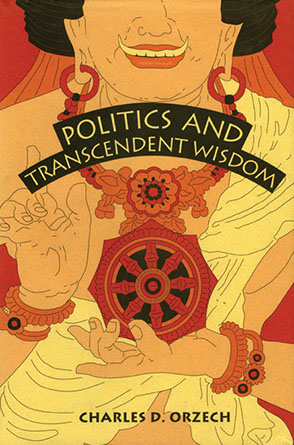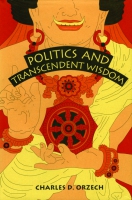
Politics and Transcendent Wisdom
The Scripture for Humane Kings in the Creation of Chinese Buddhism
Charles D. Orzech
Politics and Transcendent Wisdom
The Scripture for Humane Kings in the Creation of Chinese Buddhism
Charles D. Orzech
“Orzech’s project forces a rethinking of the relationship between religion and politics that scholars in all fields of religion will find intriguing. His focus is a Buddhist text authored in China but made to look like a translation from Sanskrit. His study excavates what the winds of history and the biases of history-writers have covered up: the fact that Tantric Buddhism occupied a crucial position in medieval Chinese civilization.”
- Media
- Description
- Reviews
- Bio
- Subjects
1999 Best First Book in the History of Religions - sponsored by the American Academy of Religion
The contexts of Buddhism as state religion in fifth- and eighth-century China are examined in detail, through extended consideration of the Transcendent Wisdom Scripture for Humane Kings Who Wish to Protect Their States, the text that was the charter for Buddhist state cults in China, Korea, and Japan into the twentieth century. The text first appeared during the fifth century as Buddhists were struggling to understand how their "foreign" religion and the "foreign" rulers of north China might be adapted to Chinese religious and political culture. The Scripture for Humane Kings and the rites enjoined by it were one answer to these questions. Three centuries later, in the context of a fully sinified Buddhism, the T'ang dynasty Tantric master Pu-k'ung produced a new version of the text with new rites that served as the centerpiece of his vision of a Chinese Buddhist state modeled on esoteric lines. The final section of this volume presents for the first time a full, annotated translation of this important East Asian Buddhist text.
“Orzech’s project forces a rethinking of the relationship between religion and politics that scholars in all fields of religion will find intriguing. His focus is a Buddhist text authored in China but made to look like a translation from Sanskrit. His study excavates what the winds of history and the biases of history-writers have covered up: the fact that Tantric Buddhism occupied a crucial position in medieval Chinese civilization.”
“This is a boon to scholars in fields related to medieval East Asian Buddhism, who value the scripture as a key text in Chinese, Korean, and Japanese Buddhist political ideology, but it is also accessible for scholars in other areas, who deal with comparable ritual apotropaic material.”
“An ambitious work on one of the most influential of the Chinese apocrypha or indigenous scriptures.”
Charles D. Orzech is Associate Professor of Religious Studies at The University of North Carolina-Greensboro. He is co-chair of the Tantric Studies Seminar of the American Academy of Religion and a founding member of the Society for Tantric Studies.
Mailing List
Subscribe to our mailing list and be notified about new titles, journals and catalogs.



